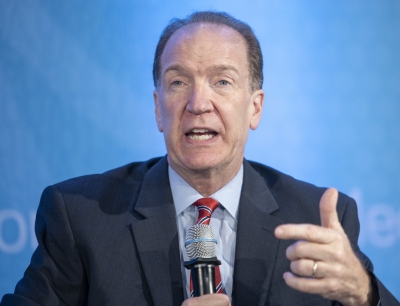BY ARUL LOUIS
United Nations– David Malpass has announced that he is quitting as the president of the World Bank to take on “new challenges” after a rift with President Joe Biden’s administration over climate change policies.
He said on Wednesday that he would be leaving the international development institution in June, ten months before the end of his five-year term.
His departure comes at a time when many countries around the world are facing severe financial problems.
Appointing the head of the World Bank is a prerogative of the US president and Biden will appoint Malpass’ successor.
Malpass was close to former President Donald Trump, who appointed him to the post in 2019 after Young Kim, an appointee of former President Barack Obama, quit.
Malpass had worked in Trump’s 2016 election campaign and became the Treasury undersecretary for international affairs before going to the World Bank.
Ideologically closer to Trump than Biden, he was dogged by the fallout of his refusal at a New York Times event last year to categorically affirm that climate change resulted from man-made greenhouse gases.
Pressed on the subject, he said, “I am not a scientist”.
Former Vice President Al Gore, a leading climate activist had dubbed him a “climate denier” and many others joined in to criticise him.
A couple of days later, Malpass changed course and wrote to World Bank Staff, “It’s clear that greenhouse gas emissions from human activities are causing climate change”.
The World Bank has been criticised for continuing financing of oil and gas projects and US Treasury Secretary Janet Yellen reportedly had goaded him to speed up changes to the bank’s functioning with more emphasis on climate change projects.
The Bank said that under his leadership, the Bank “more than doubled its climate finance to developing countries, reaching a record $32 billion last year”.
In a statement after Malpass announced his decision to quit, Yellen papered over their differences saying that he “advanced shared priorities that have measurably improved the lives of people around the globe”.
“While we all must continue to raise our collective ambitions in the fight against climate change, during President Malpass’ tenure the World Bank has made important recent advances in this area, including through the successful launch of the Country Climate Diagnostic Reports”, she added.
She said that the US will nominate his successor and expects “a transparent, merit-based and swift nomination process” from the bank’s executive board.
In the Bank statement announcing his decision to quit, Malpass said, aceWith developing countries facing unprecedented crises, I’m proud that the Bank Group has responded with speed, scale, innovation, and impact”.
The Bank said that under Malpass it had “responded quickly to global crises, mobilising a record $440 billion in response to the COVID-19 pandemic, the war in Ukraine, sharp global economic slowdown, unsustainable debt burdens, climate change, and food, fertilizer, and energy shortages”.
The Bank, which has 189 nations as members operated through five institutions, the International Bank for Reconstruction and Development, the International Development Association, the International Finance Corporation, the Multinational Investment Guarantee Agency and the International Centre for Settlement of Disputes.
Its primary role is to fund loans for development projects.
Malpass worked in various capacities with the administrations of Republican presidents Ronald Reagan and George HW Bush, and with Congress.
In 1993 he became the chief economist of the investment company Bear Sterns, which collapsed in the 2008 financial crisis.
He then set up his own economic advisory firm and made an unsuccessful bid for a Republican nomination in a senate election. (IANS)







